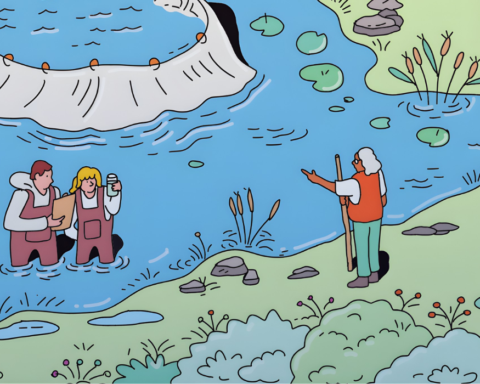An early deal on loss and damage funding for countries on the front lines of the climate emergency drew some focus away from a conflict of interest scandal embroiling COP28 organizers as United Nations climate negotiations got under way this morning in Dubai, United Arab Emirates (UAE).
On the opening day of the conference, delegates from nearly 200 countries adopted a draft framework to establish an international loss and damage fund, with the World Bank as its temporary host, Bloomberg News reports. The fund launches with US$260 million in pledges, including $100 million each from the UAE and Germany, $50 million from the United Kingdom, and $10 million from Japan.
Later in the day, the European Union came in with $250 million, including Germany’s share, followed by the United States at $17.5 million.
“This agreement is a vital first step towards ensuring communities get the support they desperately need—but stops short of the fund communities deserve,” said Tracy Carty, global political expert at Greenpeace International. “This COP must confirm that rich countries with the greatest contribution to climate change will lead the way. And that the fossil fuel industry, which continues to reap billions by exploiting fossil fuels, pays for the harm they have caused.”
“The progress made today at COP28 on loss and damage is a valuable step towards supporting people facing the devastating consequences of climate-fuelled disasters to recover and adapt,” agreed Chiara Liguori, senior climate justice policy advisor at Oxfam International. “However, much work remains to ensure the funding can truly benefit the communities most affected.”
But Adrián Martinez, director of La Ruta del Clima in Costa Rica, took a less optimistic view of what he cast as a “lost and damaged” funding mechanism. “A fund can be a functional financial mechanism but not promote justice, and this sums up the decision adopted today,” he said in a release. “Justice and dignity are not transactional, which is something parties and some NGOs have long forgotten at the UNFCCC.”
In the days leading up to the conference, COP watchers and delegates had hoped an early agreement on loss and damage would bring new momentum to a conference opening roiled by bombshell revelations that COP28 officials had sought to mix bilateral climate negotiations with oil and gas trade discussions on behalf of the summit’s host country, the UAE. COP28 President Sultan al Jaber is also the CEO of the Abu Dhabi National Oil Company (ADNOC). And on Monday, the UK-based Centre for Climate Reporting and the British Broadcasting Corporation published details of COP28 briefing notes meant to be used in targeting nearly 30 countries for international oil trade deals during pre-COP discussions.
That news shared space earlier Thursday with the word that a loss and damage deal might be imminent. “If nearly 200 nations agree during the opening session on the fund’s hard-fought outline, that could remove a major source of acrimony from the conference agenda,” Politico reports. “From there, the United States and other rich countries will have to figure out how to find potentially hundreds of billions of dollars for island nations and other vulnerable communities.”
Show Us the Money
Loss and damage has been on the international climate agenda for decades, gaining urgency as the front-line impacts of climate change become ever more severe for the world’s most vulnerable countries. A framework agreement on loss and damage was the signature win at last year’s COP27 negotiations in Egypt, and after anxious debate over most of the last year, countries reached a compromise on how to manage a new international loss and damage fund in the weeks leading up to this year’s COP.
As an estimated 70,000 delegates gathered for this year’s COP, early reports identified at least three G7 countries, including Germany, that might be ready to make concrete pledges during today’s opening session, while climate hawks attending the conference in Dubai pushed Canada to be a “first mover” in support of the fund. In a published report this morning, climate diplomacy veteran Ed King said US$290 to $580 billion will be needed “to help countries smashed by extreme weather,” and developing countries are looking for $100 billion by 2030.
“What we do anticipate at this COP will be the announcement of a new fund around this, and that countries will be in a position to voluntarily provide funding,” a Canadian government official told media in a background briefing yesterday. “Member states have come together and I believe a conclusion to that negotiation is in sight. The deal seems to be holding.”
Al Jaber Denial
The CEO of one of those fossil companies, COP President al Jaber, was on the offensive yesterday, with forceful denials that he had ever seen or made use of the briefing notes revealed by the Centre for Climate Reporting and the BBC.
In the original news exposé, a spokesperson for the COP28 organizing team did not deny that business talks may have been combined with bilateral meetings related to the UN summit. Al Jaber “holds a number of positions alongside his role as COP28 President-Designate,” the spokesperson told the two news agencies. “That is public knowledge. Private meetings are private, and we do not comment on them.”
Al Jaber took a different tack Thursday morning. “These allegations are false, not true, incorrect and not accurate,” he told media, alleging that the news report was meant to undermine his COP28 presidency. “I promise you, never ever did I see these talking points that they refer to or that I ever even used such talking points in my discussions.”
“Do you think the UAE or myself will need the COP or the COP presidency to go and establish business deals or commercial relationships?” al Jaber added. “This country over the past 50 years has been built around its ability to build bridges and to create relationships and partnerships.”
BBC stood by an investigation that a spokesperson said “was rigorously researched according to highest editorial standards.” The broadcaster said it was not invited to al Jaber’s news conference.
The controversy triggered a hoax media release Wednesday, erroneously attributed to the COP28 secretariat, claiming that al Jaber had agreed to step down from his position as ADNOC CEO.
“Following ADNOC’s recent strategic announcements that are incompatible with several clauses of the Paris Agreement, concerns were raised by several parties inside the UNFCCC and from the advisory committee about the efficacy of Dr. al Jaber’s role as President Designate if he retains his affiliations to ADNOC,” the faux release said. It had al Jaber declaring that it’s time to “replace discord with solidarity”, bring transparency to climate negotiations, and “restore trust through united climate action”.
Fossil Era’s ‘Terminal Decline’
In opening remarks early Thursday, UN climate secretary Simon Stiell urged delegates to take their responsibilities seriously.
“If we do not signal the terminal decline of the fossil fuel era as we know it, we welcome our own terminal decline. And we choose to pay with people’s lives,” he said. “If this transition isn’t just, we won’t transition at all. That means justice within and between countries.”
Stiell put countries on notice that they’ll be expected to report back to next year’s COP with a transparent account of their climate action to date, then show up at COP25 with accelerated targets to reduce climate pollution and adapt to climate impacts.
“Every single commitment—on finance, adaptation, and mitigation—has to be in line with a 1.5°C world,” because “science tells us we have around six years before we exhaust the planet’s ability to cope with our emissions,” he declared. “Attending a COP does not tick the climate box for the year. The badges around your necks make you responsible for delivering climate action here and at home.”
This story was first published by The Energy Mix. Read the original article here.







